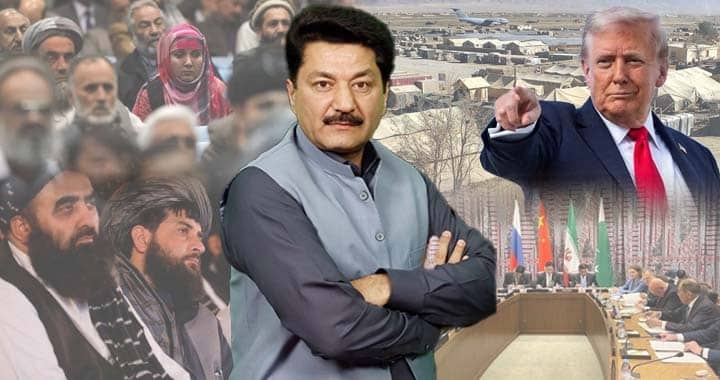The recent dialogue in Islamabad, where Afghan intellectuals, civil society representatives, and women activists participated, was an important attempt to foster understanding between the people of Pakistan and Afghanistan. However, suspicion and confusion surrounded the event, with some alleging it was an exercise against the Afghan Taliban. In reality, it was a private initiative, spearheaded by independent scholars, not a project of the Pakistani state. Yet, this reaction from Kabul underscores a larger issue, the Taliban’s hypersensitivity and their inability to distinguish between constructive engagement and perceived conspiracies.
At the same time, a parallel process unfolded on the sidelines of the United Nations General Assembly in New York. Four regional powers, Pakistan, China, Iran, and Russia, jointly pressed the Taliban to take decisive action against terrorist groups operating from Afghan soil. These countries reminded Kabul of its Doha Agreement commitments, particularly that Afghan territory must not be used against any other state.
The Taliban, however, are caught in a difficult dilemma. On one hand, they seek legitimacy and recognition as Afghanistan’s rightful government. On the other, they continue to behave as a militant movement, reluctant to take concrete measures against groups such as Tehreek-e-Taliban Pakistan (TTP), Jaish-ul-Adl, the East Turkestan Islamic Movement (ETIM), Al-Qaeda, and Daesh-Khorasan. These organisations threaten not just Pakistan, but also Iran, China, Russia, and the wider region.
Complicating matters further is the shadow of the United States. Washington has been pushing for renewed access to strategic bases in Afghanistan, particularly Bagram, which would allow it to monitor China, Iran, Russia, and even Pakistan. The Taliban leadership, aware of their twenty-year struggle against American forces, has flatly rejected any such arrangement. To reverse course now would mean betraying their ideological foundations.
While the U.S. presence remains unwelcome in Kabul, the regional picture is changing fast. Pakistan’s stature is growing, largely because of its role in connecting South Asia, Central Asia, and China through the China-Pakistan Economic Corridor (CPEC). Discussions of Afghanistan’s eventual integration into CPEC or “CPEC-II” highlight the potential for Kabul to benefit from regional connectivity. Yet, the Taliban’s intransigence keeps Afghanistan isolated.
For Pakistan, the stakes are especially high. The TTP continues to exploit Afghan soil, targeting Pakistani civilians, soldiers, and infrastructure. The Taliban leadership, instead of curbing this menace, provides space and in some cases moral support, recalling their historic ties with the group. If this continues, Kabul risks alienating the very neighbours it most depends on for political and economic survival.
Another fundamental issue is the Taliban’s refusal to form an inclusive government. The Doha Agreement envisaged broad-based representation across Afghanistan’s provinces and communities, but what exists today is a government monopolised by Taliban cadres. By rejecting pluralism, the Taliban undermine their own claims of legitimacy. Moreover, their insistence on being a “permanent” government without elections raises serious questions about accountability and long-term sustainability.
The Afghan people deserve more than a government run exclusively by one faction. They deserve political participation, economic opportunities, and regional integration. So long as Kabul remains rigid, Afghanistan risks repeating the isolation of the 1990s, when only three countries, Pakistan, Saudi Arabia, and the UAE, recognised the Taliban regime.
Pakistan, too, finds itself in a difficult spot. On the one hand, it has historically advocated for the Afghan Taliban. On the other, it faces accusations of harboring or supporting militants, accusations that grow louder whenever groups like the TTP launch cross-border attacks. This perception harms Pakistan internationally, even though Islamabad itself is a victim of terrorism.
At home, the cost is borne by ordinary Pakistanis, soldiers, policemen, and innocent civilians. Whether in Khyber Pakhtunkhwa or Balochistan, the bloodshed is real. The very recent suicide attack near Quetta’s FC Headquarters is only the latest reminder that terrorist proxies, often aided from across the border, remain determined to destabilise Pakistan.
The Taliban must now make a choice. Will they cling to the mindset of an insurgent group, or will they evolve into a responsible government? Their decisions will determine whether Afghanistan remains isolated and conflict-ridden, or whether it becomes a partner in regional progress.
For Pakistan, China, Iran, and Russia, the message is clear: they cannot allow Afghan soil to be used against them. Their joint stance reflects not only security concerns but also shared regional interests. The Taliban, if wise, should recognize that aligning with these neighbours offers far more stability than continuing down the path of defiance.
In the end, the key to peace in the region lies in Kabul. Afghanistan’s rulers must learn that good relations with neighbours, an inclusive political framework, and a firm stance against transnational terrorism are not optional, they are essential for survival. If the Taliban fail to recognize this, they risk not only their own downfall but also plunging their people into yet another cycle of endless war.





